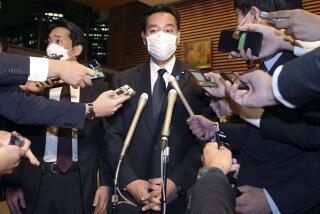Japan Official Apologizes for WWII Remark
TOKYO â In another furor over Japanâs World War II deeds, a Japanese Cabinet minister said Friday that this nation did not intend to wage a war of aggression and that its policies led to Asiaâs independence and economic growth.
But Shin Sakurai, Environmental Agency chief, retracted his statement as âinappropriateâ hours later at an emergency news conference after the South Korean government lodged a vehement protest.
Sakurai, who made his statement just days before the 49th anniversary of the end of World War II, said he agreed with Socialist Prime Minister Tomiichi Murayama that Japanâs wartime deeds caused âunbearable sorrowâ to Asian countries.
The environmental chief is a member of the conservative Liberal Democratic Party, which jointly rules with the Socialists.
The furor underscored Japanâs continuing inability to come to terms with its wartime role and the fundamental tension between the two coalition partners over the issue.
The Socialists have long urged that Japan make a forthright apology and offer more war reparations. But the Liberal Democrats have balked at further action, saying the matter of compensation has long been settled under various treaties.
Many politicians still refuse to acknowledge Japanâs wartime deeds. Earlier this year, former Justice Minister Shigeto Nagano denied that the Rape of Nanking--in which scholars say between 200,000 and 300,000 people were killed in what is now Nanjing, China--ever occurred. He later apologized but was forced to resign.
But as the warâs 50th anniversary approaches next year, Japan is aiming to settle the issue once and for all. The government is planning to contribute $10 billion over 10 years to establish a private âpeace fundâ to compensate Asian women forced into sexual slavery and other victims of Japanâs military aggression, the Asahi Shimbun reported today.
In his remarks Friday, Sakurai said it was only after soldiers went to the front that they were seized by an âunusual psychological conditionâ that caused them to âgive other people a hard time.â
He said that, because of Japanâs efforts, Asian nations were liberalized, educated and given infrastructure that laid the groundwork for their rapid postwar economic growth.
More to Read
Sign up for Essential California
The most important California stories and recommendations in your inbox every morning.
You may occasionally receive promotional content from the Los Angeles Times.











